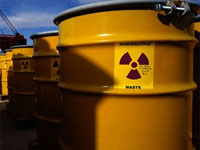Scientists dissuade George W. Bush from ambitious nuclear waste proposal
The National Academy of Sciences strongly recommends George W. Bush to refuse an idea to resume nuclear waste reprocessing that is the heart of the administration's push to expand the civilian use of nuclear power in the US.

A 17-member panel of the Academy's National Research Council said the proposed Global Nuclear Energy Partnership, or GNEP, has not been adequately peer reviewed and is banking on reprocessing technology that has not been proven, or is not expected to be ready in the time the administration envisions.
The report, released Monday, said GNEP research is taking money and focus away from other nuclear research programs and efforts to speed the construction of new nuclear power plants.
"All committee members agree that the GNEP program should not go forward and that it should be replaced by a less aggressive research program," said the panel. It said if the administration proceeds as planned there will be "significant technical and financial risks."
Bush announced the global nuclear initiative in early 2006 and has repeatedly touted it as key to U.S. efforts to deal with a growing amount of highly radioactive reactor waste and still allow a large expansion of commercial nuclear power. Internationally, the plan envisions a small number of countries including the United States and Russia supplying other nations with reactor fuel and reprocessing their used fuel.
The Energy Department was preparing a response to the report.
Only last week, Energy Secretary Samuel Bodman cited the importance of the GNEP program. He said in a speech it "represents the future of global nuclear power cooperation" and will "allow for a greater global reliance on civilian nuclear power to produce the electricity needed" while safeguarding against proliferation.
Bush touted the reprocessing program during a visit to the Browns Ferry nuclear power plant in the state of Alabama last summer, calling nuclear fuel reprocessing and the GNEP program critical for the expansion of the commercial nuclear power industry.
The Academy panel said it did not address the pros and cons of the international aspects of the GNEP program, but expressed deep reservations about its ability to address the U.S. waste disposal issue.
The GNEP program has been criticized by nuclear nonproliferation activists and has received a chilly reception in Congress, which has refused to provide the short-term funding the Energy Department has requested. The administration wanted nearly $395 million (€274.4 million) for the program this year, but is getting $167 million.
Although nuclear fuel reprocessing continues in Europe and Japan, the United States abandoned it in the 1970s because of concerns that the stream of pure plutonium that is created poses a nuclear proliferation risk. But the GNEP program envisions adopting a different reprocessing method that its advocates argue would not create pure plutonium.
But the Academy panel of scientists said that "significant technical problems remain to be solved" in development of the new approach, known as the "UREX" process.
The GNEP program is expected to cost billions of dollars over several decades and includes construction of reprocessing plants and next-generation "fast-burn" reactors to burn some of the processed waste.
The Energy Department maintains that the program in the long run will reduce the cost of commercial reactor waste disposal and remove the need for additional underground waste repositories beyond the proposed waste dump in Nevada.
Subscribe to Pravda.Ru Telegram channel, Facebook, RSS!


